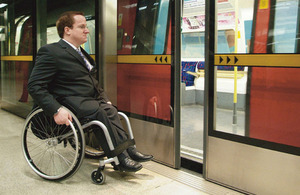International Day of Disabled People – Tuesday 3 December 2013
Top institutions will improve accessibility for country’s 12m disabled people.

Six of the top professional institutions that represent architects, town planners, surveyors, engineers and facilities managers have committed to improving accessibility for the country’s 12 million disabled people, on International Day of Disabled People (3 December 2013).
Built environment institutions including The Royal Town Planning Institute, The Royal Institution of British Architects and The British Institution of Facilities Managers have now signed up to the Built Environment Professional Education Project – to seek ways of changing the curriculum so inclusive design becomes a requirement of all built environment accredited courses at universities and colleges.
The Royal Institution of Chartered Surveyors and the Institution of Civil Engineers have also signed up to the project with the aim of having nearly one third of all built environment professionals being proficient in inclusive design within 10 years.
The success of London 2012 ‘the most accessible games ever’ has stimulated a drive to ensure that all buildings, places and spaces are designed inclusively in future. The project is being funded by Department for Work and Pensions, Greater London Authority and Department for Business, Innovation and Skills.
Analysis following the games shows that 59% of disabled visitors were positive about overall access in London with 55% positive about accessible facilities in public areas. Nationally studies highlight the buildings where disabled people have the most difficulties with accessibility:
- shops (54%)
- hospitals (34%)
- bars and restaurants (23%)
Minister of State for Disabled People, Mike Penning said:
Last year’s Paralympics truly captivated the hearts of the nation and have undoubtedly helped shift attitudes and perceptions towards disabled people.
That also included recognising that disabled people should be able to have the same access to buildings and sporting stadiums as everyone else – which we saw with the award-winning Olympic Stadium where so many memories were made.
I want to see the architects and planners of the future be able to put accessibility at the heart of their designs – and I’ll be working with professional bodies and academics to make that happen.
Sir Edward Lister, Deputy Mayor of London for Planning said:
The 2012 Olympic and Paralympic Games were widely recognised as the most inclusive ever and one way we achieved that was through the design of the venues and the Park.
We set ourselves the highest standards of inclusive design and now we are building on that success to ensure that accessibility is at the heart of education for all built environment professionals.
Lord Coe said:
The focus of this project on training and education will mean a lasting Paralympic legacy which will inspire future generations of built environment professionals to achieve truly accessible and inclusive environments for everyone.
Accessibility at the Olympic Park included accessible routes through and to the park, accessible public transport, the games mobility scheme, the volunteers and the management that made the games the most accessible ever.
Other points of interest include viewing areas for wheelchair users, easily accessible spacious toilet facilities, including changing places toilets for people who need the extra space and changing bench and hoist.
With all major built environment professional bodies due to review their curriculum in the next 5 years, there is a ‘golden opportunity’ to include changes as part of this.
Almost 20% of the UK population is disabled (around 12m), and the disability ‘purple pound’ is worth £80 billion to the GB economy.
More information
The Life Opportunities Survey highlight the buildings where disabled people have the most difficulties with accessibility – shops (54%), hospitals (34%) and bars and restaurants (23%).
Canadian and Australian studies of inclusive design have shown it can have a significant impact on GDP. A Canadian study in Ontario has suggested a potential boost of up to 1.8% – but currently less than 10% of university academics include it as part of their assessment criteria.
The GLA consumer research says that 59% of visitors were positive about overall access and 55% positive about accessible facilities in public areas.
Contact Press Office
Press Office
Caxton House
Tothill Street
London
SW1H 9NA
Telephone: 0115 965 8781
Media enquiries for this press release – 0203 267 5126
Follow DWP on:
- Twitter – www.twitter.com/dwppressoffice
- Facebook – www.facebook.com/dwp
- LinkedIn – www.linkedin.com/company/dwp
- YouTube – www.youtube.com/dwp